अपनी भाषा में प्लॉट जोड़ेंA prison reformer and a controversial judge fall in love and have a child out of wedlock.A prison reformer and a controversial judge fall in love and have a child out of wedlock.A prison reformer and a controversial judge fall in love and have a child out of wedlock.
- पुरस्कार
- कुल 2 जीत
J. Carrol Naish
- Dr. Sorelle
- (as J. Carroll Naish)
Rafaela Ottiano
- Mrs. Feldermans
- (as Rafaella Ottiano)
Wally Albright
- Mischa Feldermans
- (बिना क्रेडिट के)
Margaret Armstrong
- Miss Jones
- (बिना क्रेडिट के)
Irving Bacon
- Waiter
- (बिना क्रेडिट के)
May Beatty
- Nurse
- (बिना क्रेडिट के)
फ़ीचर्ड समीक्षाएं
To call Ann Vickers a women's picture may technically be accurate--it was, indeed, adapted by Jane Murfin, also responsible for 1939's The Women--but it's much more than that. Quite simply, this is one of the best dramas ever produced in Hollywood. Written with delicacy and tenderness, yet planted firmly in the cruel realities of life, Ann Vickers includes a tour de force performance by Irene Dunne, ably supported by the wonderful Walter Huston as her lover, and Conrad Nagel and Bruce Cabot as would be paramours. There are some incredibly powerful moments here, especially during the prison scenes, and Dunne and Huston are magical whenever they're on screen together. Certainly daring by the standards of the time, Ann Vickers is a refreshingly honest and still topical masterpiece.
ANN VICKERS is a bizarre tear-jerker from the early days of sound movies featuring IRENE DUNNE as a woman who is well-intentioned but makes all the wrong choices in life, including the men she thinks she loves.
BRUCE CABOT is her first mistake, a man proclaiming great love for her but abandoning her not long after she bears his child. In a weak supporting role, she treats CONRAD NAGEL as a man she cannot love but values as a friend. He's not too happy about that arrangement.
Then comes married man WALTER HUSTON, unhappily married who finds Dunne a refreshing bit of love interest. She has a career that keeps her busy and stands by him when he is accused of mismanaging funds. He's soon imprisoned but she finds a way to get his case some political attention and eventually he is free to marry her.
That's about it, all handled in dreary fashion with hardly a note of music on the soundtrack to lift it out of the doldrums when it gets too soggy to bear. As social commentary on conditions in the 1930s and women's issues, it's a failure. Miss Dunne plays a social worker who rises to play an important role in the penal system for females.
IRENE DUNNE suffers nobly, but it's a weak vehicle for a strong actress and she can do nothing to give the film a sense of real life struggles. Chalk this one up as a failure, even if it was based on a novel penned by no less than Sinclair Lewis. Evidently, not too much has been retained from his novel.
Summing up: Not worth your time. Any film that wastes the talents of EDNA MAY OLIVER as a Duchess has got to make you wonder what they were thinking. It's her dullest role ever.
BRUCE CABOT is her first mistake, a man proclaiming great love for her but abandoning her not long after she bears his child. In a weak supporting role, she treats CONRAD NAGEL as a man she cannot love but values as a friend. He's not too happy about that arrangement.
Then comes married man WALTER HUSTON, unhappily married who finds Dunne a refreshing bit of love interest. She has a career that keeps her busy and stands by him when he is accused of mismanaging funds. He's soon imprisoned but she finds a way to get his case some political attention and eventually he is free to marry her.
That's about it, all handled in dreary fashion with hardly a note of music on the soundtrack to lift it out of the doldrums when it gets too soggy to bear. As social commentary on conditions in the 1930s and women's issues, it's a failure. Miss Dunne plays a social worker who rises to play an important role in the penal system for females.
IRENE DUNNE suffers nobly, but it's a weak vehicle for a strong actress and she can do nothing to give the film a sense of real life struggles. Chalk this one up as a failure, even if it was based on a novel penned by no less than Sinclair Lewis. Evidently, not too much has been retained from his novel.
Summing up: Not worth your time. Any film that wastes the talents of EDNA MAY OLIVER as a Duchess has got to make you wonder what they were thinking. It's her dullest role ever.
It is doubtful if, at this point in time, anyone needs to be reminded of the consistent excellence of the versatile Irene Dunne, whose presence enhanced drama, comedy and musical films for many years. ANN VICKERS recalls to us how effective her subtle talent was even early in her career, playing a character alternately strong and vulnerable in a story too crowded with incident to give its major players the room they require to draw the characters fully. As a capable and resolute professional woman involved in social work and prison reform, Dunne's title character is curiously susceptible to the less-than-worthy men she finds more appealing than the steady earthbound types she encounters but does not favor. This contradictions accounts for a large part of the interest in her character, discreetly but firmly abetted by the nuances of yet another outstanding performance. Irene Dunne is perhaps the most reliable of all leading ladies. If you share the admiration of many for her work, this somewhat obscure picture will not disappoint you.
9cng4
This is what a woman's film ought to be in this era, not just 70 years ago. The Ann Vickers character is a strong woman devoted to her career and to those who depend on her at the women's prison. She is not without her flaws as any hero or protagonist, but she overcomes so many obstacles and definitely has control over her life. What has happened to strong and complex female roles in modern motion pictures? This movie is well acted, well-written and has a tremendous message. I recommend it to anyone who can get their hands on it, as I believe it is still not available on video. It ranks up there with Norma Shearer's character Jerry in "The Divorcee" as far as a well-developed complex strong female characters. We need more movies depicting our gender this way not just as sex objects but as sexual subjects, with career goals and sex drives. Watch this movie!
It seems ridiculous to us now that this was so controversial at the time and put the censors into a wild uncontrollable rage. Perhaps that's because it doesn't quite feel like an early thirties movie. The acting, the production and certainly the story seem much more modern.
Taken out of the context of its age, it's a fairly ordinary plot. There's no doubt it is extremely well made and but at the end of the day, it's just a story about an ordinary social worker. It's not something that you can get too excited about or want to watch again. Plenty of early thirties pictures are still entertaining as stand alone movies today - this however is one of those which is only interesting as a presentation of the morality, the attitudes, prejudices and constraints of the time.
Unlike some other "social injustice movies" of the time, this doesn't use an emotional sledgehammer to get its point across. Whilst that makes this feel more modern, if you love that old sensationalist approach such as used in NIGHT COURT or SAFE IN HELL you might find this a little bland and disappointing.
Taken out of the context of its age, it's a fairly ordinary plot. There's no doubt it is extremely well made and but at the end of the day, it's just a story about an ordinary social worker. It's not something that you can get too excited about or want to watch again. Plenty of early thirties pictures are still entertaining as stand alone movies today - this however is one of those which is only interesting as a presentation of the morality, the attitudes, prejudices and constraints of the time.
Unlike some other "social injustice movies" of the time, this doesn't use an emotional sledgehammer to get its point across. Whilst that makes this feel more modern, if you love that old sensationalist approach such as used in NIGHT COURT or SAFE IN HELL you might find this a little bland and disappointing.
क्या आपको पता है
- ट्रिवियाSome objections were made by the Hays Office concerning the plot of the first draft of the screenplay, where Ann marries Captain Resnick and then has an affair with Barney. The plot was changed to Ann being seduced by the Captain with the offense somehow deemed less if only one of the parties in the adulterous affair is married. No reference is made about any abortion in the trip to Havana, and in the released print the cause of death of Ann's baby girl is never mentioned. RKO applied for an "Approved" certificate in 1935, when the production code was more rigorously enforced, but they were informed that no certificate would be given because of the film's attitude towards adultery.
- गूफ़Although the first part of the picture takes place in 1918, all of Irene Dunne's hairstyles and clothes are strictly in the 1933 mode, and continue as such through the decade of the 1920s which follows.
- भाव
Barney Dolphin: [last lines]
Matthew Dolphin: Who are you?
Barney Dolphin: Well, son, i refuse to answer without advice of counsel.
- क्रेज़ी क्रेडिटThe opening credits are printed in the pages of the novel. They are revealed by a man's hand opening the book and turning the pages.
- साउंडट्रैकSmiles
(1917) (uncredited)
Music by Lee S. Roberts
Lyrics by J. Will Callahan
Played by a band for dance music at the Lorlears Hook Settlement House
Whistled by Sam Hardy
Danced by Sam Hardy and Helen Cromwell and other couples
टॉप पसंद
रेटिंग देने के लिए साइन-इन करें और वैयक्तिकृत सुझावों के लिए वॉचलिस्ट करें
विवरण
- रिलीज़ की तारीख़
- कंट्री ऑफ़ ओरिजिन
- भाषा
- इस रूप में भी जाना जाता है
- Sinclair Lewis' Ann Vickers
- फ़िल्माने की जगहें
- उत्पादन कंपनी
- IMDbPro पर और कंपनी क्रेडिट देखें
बॉक्स ऑफ़िस
- बजट
- $3,03,000(अनुमानित)
- चलने की अवधि
- 1 घं 16 मि(76 min)
- रंग
- पक्ष अनुपात
- 1.37 : 1
इस पेज में योगदान दें
किसी बदलाव का सुझाव दें या अनुपलब्ध कॉन्टेंट जोड़ें

































